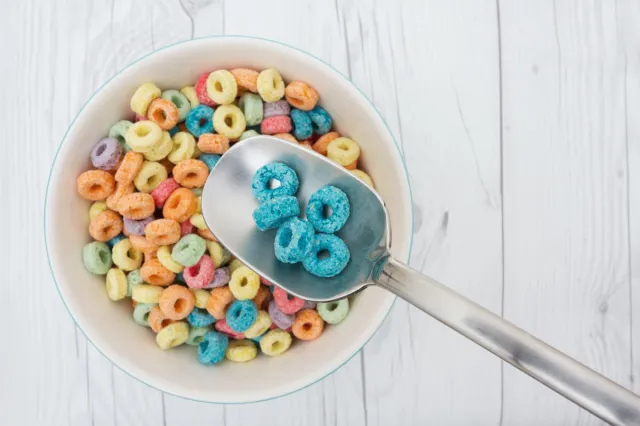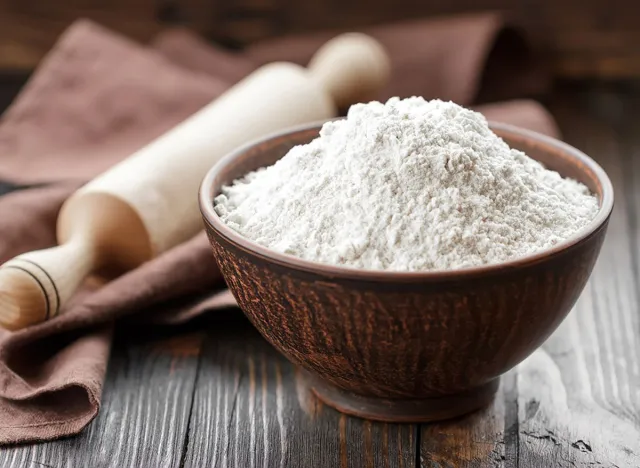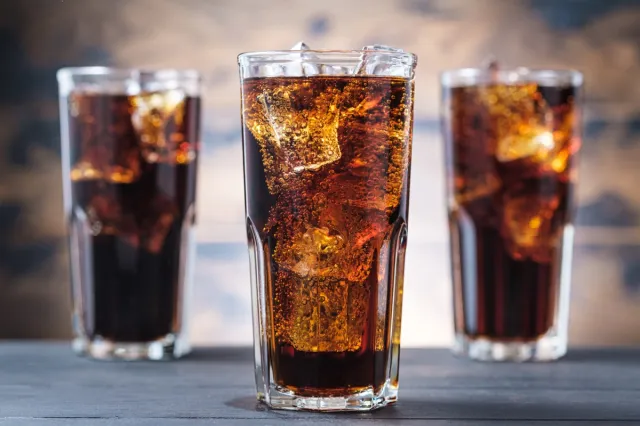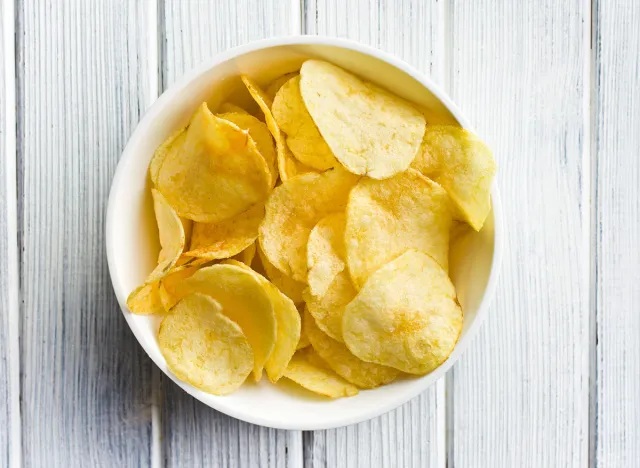11 Foods That Are Aging You Faster

While it's hard to escape our chronological age, our biological age isn't as set in stone. Our lifestyle—including the foods we eat—determines how fast we age on a biological level, and the way we look and feel might not reflect the number of trips we've made around the sun.
"Biological aging refers to the gradual deterioration of functional characteristics at the cellular and molecular levels, which can be influenced by lifestyle factors, including diet," says Danielle Crumble Smith, RD, a dietitian with Top Nutrition Coaching.
"Eating a balanced diet rich in antioxidants, essential fatty acids, vitamins, minerals, and fiber, while minimizing processed foods, sugars, unhealthy fats, and excessive sodium and alcohol is crucial for supporting longevity by slowing down the aging process and promoting overall well-being," says Marlyne Perez, RDN, LD, a dietitian with Top Nutrition Coaching.
On the other hand, an unhealthy diet—one that lacks essential nutrients and antioxidants and is rich in processed foods, sugars, and unhealthy fats—can result in chronic inflammation, oxidative stress, compromised gut health, and metabolic issues, Perez says. "These factors collectively accelerate cellular damage, impair organ function, and increase the risk of age-related diseases, contributing to an elevated biological age," she adds.
Clearly, a nutrient-dense diet is key to helping slow down your biological clock. That's why we spoke to two dietitians about the top foods that can age you faster if you eat them on the reg. That said, you're welcome to enjoy these foods in moderation—just focus on filling your diet with nutrient-dense foods and saving these for special occasions.
Sugary cereals

While cereals can be a wholesome breakfast, many on the market are riddled with added sugars. And when you're getting most of your calories from sugar, especially first thing in the morning, that can cause rapid spikes in blood glucose, which prompts the body to quickly release insulin to regulate those sugar levels. "Over time, this continuous fluctuation in blood sugar and insulin levels can lead to insulin resistance and increased oxidative stress, contributing to accelerated aging processes in the body," Perez says.
What's more, regularly eating high-sugar foods like sugary cereals can contribute to weight gain and obesity, two conditions associated with a host of metabolic issues, such as type 2 diabetes and cardiovascular diseases.
A diet high in sugar might even manifest itself on your skin. Excess sugar reacts with proteins in your body, such as collagen and elastin, through a process called glycation. This can lead to the formation of Advanced Glycation End Products (AGEs), which make collagen and elastin stiff and less elastic, per a 2021 review in Experimental & Molecular Medicine. "The damage to collagen and elastin, [which are] vital for maintaining youthful and supple skin, manifests as premature aging signs on the skin," Smith says, adding that it can result in wrinkles and sagging skin.
Hot dogs and bacon

An occasional bacon, egg, and cheese on a weekday morning or a grilled hotdog at a summer cookout is nothing to fret about, but including processed meats in your diet regularly isn't a smart move.
Processed red meats are rich in saturated fats and often contain preservatives like nitrates, which can contribute to biological aging by promoting chronic inflammation and oxidative stress in the body, Smith says. "These factors accelerate cellular aging and increase the risk of age-related diseases such as cardiovascular disease and certain cancers. Additionally, the consumption of processed meats is linked to the formation of harmful compounds that can damage DNA and proteins, further exacerbating the aging process."
Eating red or processed meat at least four times a week was associated with a 20% higher risk of colorectal cancer than eating it less than twice a week, per a 2020 International Journal of Epidemiology study.
Alcohol

The ocassional glass of wine with dinner or cocktail at happy hour won't do any lasting damage, but binge-drinking every weekend or making alcohol a mainstay in your diet might.
Alcohol can bump up your chronological age in three key ways. First, it's a diuretic, which means it makes you urinate more. This can lead to dehydration, resulting in dry and dull skin with an increased likelihood of wrinkles and fine lines, Smith says.
Second, "Alcohol hinders the absorption of vital nutrients such as vitamins B12 and folate, along with antioxidants, compromising cellular health and contributing to cognitive decline, raising the risk of age-related neurological disorders like Alzheimer's and dementia," Smith says.
Lastly (but definitely not least), alcohol can cause liver damage, including fatty liver, hepatitis, and cirrhosis. "This impairs the liver's ability to efficiently metabolize toxins and maintain overall bodily functions, potentially accelerating aging processes throughout the body," Smith tells us.
Refined white flour

Foods like white bread, bagels, pretzels, and pasta are all made of refined grains, which are stripped of all the fiber and nutrients that make the grains healthy in the first place. This milling process causes the foods to become high-glycemic, meaning they can lead to rapid spikes in blood sugar and insulin levels. "This spike and subsequent drop in blood sugar can cause oxidative stress and inflammation, accelerating cellular aging," Smith says.
"Additionally, the lack of fiber and essential nutrients in refined white flour, compared to whole grains, deprives the body of key anti-aging nutrients—such as B vitamins, antioxidants, vitamin E, and minerals—further contributing to the aging process."
Soda and other sugary drinks

Sodas and sugary drinks like sweet tea give you nothing beneficial in terms of nutrition, and drinking them regularly has been linked to myriad health issues. That's mainly because all of these beverages' calories come from added sugars.
The consumption of sugar-sweetened beverages "contributes to biological aging primarily due to its high sugar content, leading to increased oxidative stress, inflammation, and the formation of advanced glycation end products (AGEs) that accelerate cellular aging and tissue damage," Smith says.
This excessive sugar intake can contribute to insulin resistance and increased fat accumulation, which are linked to obesity, type 2 diabetes, and cardiovascular disease—all markers of aging and shorter telomeres. FYI, telomeres protect the ends of chromosomes, and their length is an indicator of cellular aging. Poor diet has been associated with shorter telomeres, per a 2011 report in The Journal of Nutritional Biochemistry.
What's more, "soda contains phosphoric acid, which may hinder calcium absorption, potentially reducing bone mineral density and increasing the risk of conditions like osteoporosis and bone fractures associated with aging," Perez says.
Fried food

Fried food, like chicken nuggets, burgers, and fries often contain trans fats, particularly when the frying oils are reused over and over again—which is a common practice in many fast-food restaurants.
"These trans fats contribute to inflammation and oxidative stress in the body, processes that accelerate cellular aging and increase the risk of age-related diseases like heart disease and diabetes," Smith says.
Here's how reusing oils can lead to trans fat: When oil is heated repeatedly, it undergoes oxidation and thermal degradation, Smith tells us. "The repeated heating causes the unsaturated fatty acids in the oil to undergo structural changes—and one of these changes can be the conversion of cis-fatty acids (naturally occurring in most vegetable oils) into trans-fatty acids. Oils with high concentrations of unsaturated fats (like soybean, sunflower, or corn oil, which are all commonly used for frying) are more prone to forming trans fats when overheated or reused." Plus, higher temperatures and longer heating times increase the rate of trans fat formation.
Restaurant Foods

Even if you're not zooming through the drive-thru to grab a cheeseburger and fries, dining out at restaurants won't do wonders for your body—especially as you age.
"Restaurant foods, though convenient, can contribute to aging due to factors such as high levels of unhealthy fats, including saturated and trans fats, leading to inflammation and an elevated risk of age-related diseases," Perez says. What's more, most of these meals contain more than a full day's worth of sodium—and even seemingly savory restaurant dishes can sneak in loads of sugar, too. "Restaurant meals are often high in added sugars and salt, contributing to the risk of metabolic disorders like obesity and hypertension, which are linked to accelerated aging," Smith says.
What's more, harmful compounds like AGEs and potentially carcinogenic substances can be produced through certain restaurant cooking methods, such as frying or grilling at high temperatures, contributing to cellular damage and accelerated aging.
But not all restaurant meals are bound to zap your fountain of youth. Some establishments (like these dietitian-approved restaurants) prioritize fresh ingredients, use healthier cooking methods, and offer nutritious options. "Making informed choices by selecting meals rich in vegetables, lean proteins, and whole grains, while limiting processed or fried foods, can help mitigate potential negative effects on the aging process," Perez says.
Deli meats

Ham, salami, and sliced turkey breast are all delicious sandwich essentials, but you shouldn't make them a part of your daily diet. Deli meats, which are often high in preservatives like sodium and nitrates, contribute to biological aging primarily through the promotion of oxidative stress and inflammation in the body, Smith tells us. "These preservatives, along with AGEs formed during processing, can damage cells and tissues, accelerating the aging process at a cellular level."
Not only that, but deli meats are sky-high in sodium. Take packaged ham: just three slices contain about 652 milligrams of sodium, which is 27% of your daily value. "The high sodium content in deli meats can contribute to hypertension and cardiovascular issues, which are key factors in age-related health decline," Smith says.
Potato chips

When the salt craving hits, you might be tempted to grab a bag of potato chips, but we all know how hard it is to stop at just a handful. And a potato chip habit isn't necessarily helping you halt the aging process.
"Commercially produced potato chips are often cooked in unhealthy oils at high temperatures, leading to the formation of trans fats," Perez says. "The high-temperature cooking process for starchy foods like potatoes in chip production can generate acrylamide, considered a potential carcinogen that may contribute to cellular damage and aging-related processes," Perez says.
Not only that but potato chips have a high glycemic index and high salt content. "The sodium content in potato chips can result in water retention, increased blood pressure, and strain on the cardiovascular system, potentially hastening aging in blood vessels and organs," Perez says.
Sugary baked goods

Baked goods—think: cookies, pastries, muffins, and the like—are all made with refined flour and are high in added sugars. Sometimes, they can even contain a bit of trans fat. All of these factors contribute to biological aging by promoting inflammation and oxidative stress.
"The high sugar content can lead to the formation of AGEs that damage collagen and elastin, key proteins for maintaining youthful skin; while trans fats can negatively impact cardiovascular health and cellular integrity," Smith says.
Agave and other syrups

Sweeteners such as agave syrup, corn syrup, and certain maple syrups are high in fructose, a type of sugar linked to health issues such as insulin resistance, liver fat accumulation, and elevated triglyceride levels, contributing to metabolic issues and accelerated aging, Perez says.
Similarly to refined sugar, excessive fructose also forms AGEs, potentially causing damage to collagen and elastin in the skin, which contributes to wrinkles, decreased elasticity, and skin aging. "Regular consumption of these sweeteners may result in weight gain, metabolic syndrome, and increased risks of cardiovascular diseases and type 2 diabetes, associated with accelerated aging and age-related health issues," Perez says.
If you're using these sweeteners daily instead of prioritizing whole foods (like if you're sweetening your morning bowl of oatmeal with agave instead of fruit), this "can create nutrient imbalances, displacing nutrient-rich foods and impacting overall health, thereby contributing to accelerated aging processes," Perez says.
The bottom line: "Choosing whole fruits for sweetness and minimizing reliance on added sugars and sweeteners can contribute to better health outcomes and potentially slow down the aging process," Perez says.
- Source: Rungratanawanich, W., Qu, Y., Wang, X., Essa, M. M., & Song, B. J. (2021). Advanced glycation end products (AGEs) and other adducts in aging-related diseases and alcohol-mediated tissue injury. Experimental & molecular medicine, 53(2), 168–188. https://doi.org/10.1038/s12276-021-00561-7
- Source: Bradbury, K. E., Murphy, N., & Key, T. J. (2020). Diet and colorectal cancer in UK Biobank: a prospective study. International journal of epidemiology, 49(1), 246–258. https://doi.org/10.1093/ije/dyz064
- Source: Paul, L. (2011). Diet, nutrition and telomere length. The Journal of Nutritional Biochemistry, 22(10), 895–901. https://doi.org/10.1016/j.jnutbio.2010.12.001









